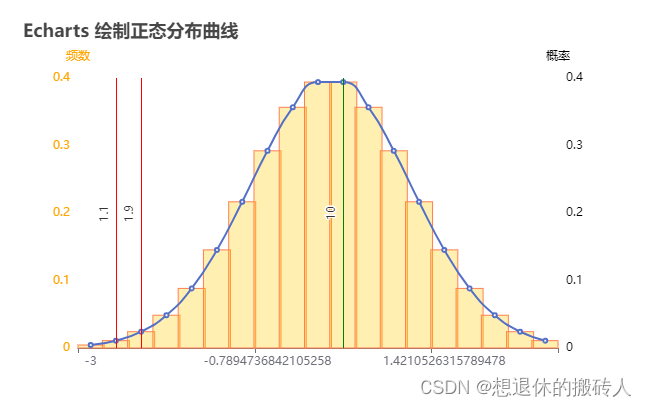
<template>
<div id="main"></div>
</template>
<script setup>
import { onMounted } from "vue";
import * as echarts from "echarts";
let data={
x:[
-3,-2.6842105263157894,-2.3684210526315788,
-2.052631578947368,-1.7368421052631575,-1.421052631578947,-1.1052631578947363,
-0.7894736842105258,-0.47368421052631526,-0.15789473684210475,
0.15789473684210575,0.47368421052631626,0.7894736842105268,
1.1052631578947372,1.4210526315789478,1.7368421052631584,
2.052631578947369, 2.3684210526315796,2.6842105263157903],
y:[
0.0044318484119380075, 0.010873446008403894, 0.02414573124668899,
0.04852933916733306, 0.08827937454560608, 0.14534663197630093,
0.21659157163219764, 0.292125176410827, 0.3566048764304543,
0.394000182232257, 0.39400018223225697, 0.3566048764304541,
0.29212517641082686, 0.21659157163219742, 0.14534663197630074,
0.08827937454560594, 0.04852933916733297, 0.024145731246688947,
0.010873446008403865],
};
const sum=()=> {
if (data.y.length === 0) return 0
return data.y.reduce((prev, curr) => prev + curr)
};
const average=()=> {
return sum() / data.y.length
};
console.log('平均值',average());
let median;
const deviation=()=> {
// 1、求平均数
const avg = average();
// 2、返回偏差。 f(x) = x - avg
return data.y.map(x => x - avg)
};
console.log('偏差',deviation());
const variance=()=> {
if (data.y.length === 0) return 0
// 1、求偏差
const dev = deviation();
// 2、求偏差平方和
const sumOfSquOfDev = dev.map(x => x * x).reduce((x, y) => x + y)
// 3、返回方差
return sumOfSquOfDev / data.y.length - 1
};
console.log('方差',variance());
const standardDeviation=() =>{
return (Math.sqrt(Math.abs(-variance())))
};
console.log('标准差',standardDeviation());
const standarDevRangeOfOne=() =>{
return {
low: average() - 1 * standardDeviation(),
up: average() + 1 * standardDeviation()
}
};
console.log('1倍标准偏差',standarDevRangeOfOne());
const standarDevRangeOfTwo=()=> {
return {
low: average() - 2 * standardDeviation(),
up: average() + 2 * standardDeviation()
}
};
console.log('2倍标准偏差',standarDevRangeOfTwo());
const standarDevRangeOfThree=()=> {
return {
low: average() - 3 * standardDeviation(),
up: average() + 3 * standardDeviation()
}
};
console.log('3倍标准偏差',standarDevRangeOfThree());
const min=() =>{
return Math.min(...data.y)
};
console.log('min',min());
const max=() =>{
return Math.max(...data.y)
};
console.log('max',max());
onMounted(() => {
// 1.基于准备好的dom,初始化echarts实例
var myChart = echarts.init(document.getElementById("main"));
// 2.指定图表的配置项和数据, Echarts 图的配置
var option = {
// Echarts 图 -- 标题
title: {
text: 'Echarts 绘制正态分布曲线'
},
// Echarts 图 -- 工具
tooltip: {},
// Echarts 图 -- 图例
legend: {
data: ['f(x)']
},
// Echarts 图 -- x 坐标轴刻度 -- 正态分布数值
xAxis: [{
// name : "标准刻度(0.1)",
data: data.x,
// min: this.min,
// max: this.max
}],
// Echarts 图 -- y 坐标轴刻度
yAxis: [
{
type: 'value',
name: '频数',
position: 'left',
// 网格线
splitLine: {
show: false
},
axisLine: {
lineStyle: {
color: 'orange'
}
},
axisLabel: {
formatter: '{value}'
}
},
{
type: 'value',
name: '概率',
position: 'right',
// 网格线
splitLine: {
show: false
},
axisLine: {
lineStyle: {
color: 'black'
}
},
axisLabel: {
formatter: '{value}'
}
},
],
// Echarts 图 -- y 轴数据
series: [
{
name: '源数据', // y 轴名称
type: 'bar', // y 轴类型
yAxisIndex: 0,
barGap: 0,
barWidth: 27,
itemStyle: {
normal: {
show: true,
color: 'rgba(255, 204, 0,.3)', //柱子颜色
borderColor: '#FF7F50' //边框颜色
}
},
data: data.y, // y 轴数据 -- 源数据
},
{
name: '正态分布', // y 轴名称
type: 'line', // y 轴类型
// symbol: 'none', //去掉折线图中的节点
smooth: true, //true 为平滑曲线
yAxisIndex: 1,
data: data.y, // y 轴数据 -- 正态分布
// 警示线
markLine: {
symbol: ['none'], // 箭头方向
lineStyle: {
type: "silent",
color: "green",
},
itemStyle: {
normal: {
show: true,
color: 'black'
}
},
label: {
show: true,
position: "middle"
},
data: [
{
name: '一倍标准差',
xAxis: standarDevRangeOfOne().low.toFixed(1),
// 当 n 倍标准差在坐标轴外时,将其隐藏,否则它会默认显示在最小值部分,容易引起混淆
lineStyle: {
opacity: (min() > standarDevRangeOfOne()
.low) ? 0 : 1
},
label: {
show: !(min() > standarDevRangeOfOne().low)
}
},
{
name: '一倍标准差',
xAxis: standarDevRangeOfOne().up.toFixed(1),
lineStyle: {
opacity: (max() < standarDevRangeOfOne().up) ?
0 : 1
},
label: {
show: !(max() < standarDevRangeOfOne().up)
}
},
{
name: '二倍标准差',
xAxis: standarDevRangeOfTwo().low.toFixed(1),
lineStyle: {
opacity: (min() > standarDevRangeOfTwo()
.low) ? 0 : 1
},
label: {
show: !(min() > standarDevRangeOfTwo().low)
}
},
{
name: '二倍标准差',
xAxis: standarDevRangeOfTwo().up.toFixed(1),
lineStyle: {
opacity: (max() < standarDevRangeOfTwo()
.up) ? 0 : 1
},
label: {
show: !(max() < standarDevRangeOfTwo().up)
}
},
{
name: '三倍标准差',
xAxis: standarDevRangeOfThree().low.toFixed(1),
lineStyle: {
opacity: (min() > standarDevRangeOfThree()
.low) ? 0 : 1
},
label: {
show: !(min() > standarDevRangeOfThree().low)
}
},
{
name: '三倍标准差',
xAxis: standarDevRangeOfThree().up.toFixed(1),
lineStyle: {
opacity: (max() < standarDevRangeOfThree()
.up) ? 0 : 1
},
label: {
show: !(max() < standarDevRangeOfThree().up)
}
},
{
name: '平均值',
xAxis: average().toFixed(1),
lineStyle: {
color: 'red'
}
},
{
name: '中位值',
xAxis: 10,
lineStyle: {
color: 'green'
}
},
{
name: '下偏差',
xAxis: 1.1,
lineStyle: {
color: 'red'
}
},
{
name: '上偏差',
xAxis: 1.9,
lineStyle: {
color: 'red'
}
}
]
}
}
],
};
// 3.使用刚指定的配置项和数据显示图表。
myChart.setOption(option);
window.addEventListener("resize", () => {
myChart.resize()
})
});
</script>
<style>
#main {
width: 600px;
height: 400px;
}
</style>
